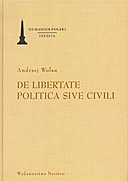Andreas Volanus’s On Liberty
A critical edition of the treatise De libertate politica sive civili (On Political or Civil Liberty) by Andreas Volanus, published in 1572 and soon translated into Polish. This bilingual edition contains both versions.

If there is one book I am quite proud of, it is certainly a critical edition (completed together with prof. Roman Mazurkiewicz) of the political treatise De libertate politica sive civili (On Political or Civil Liberty) written by Andreas Volanus (Andrzej Wolan) in 1572, and soon translated into by Polish by Stanisław Dubingowicz (O wolności rzeczypospolitej albo ślacheckiej, 1606). Volanus’s political treatise on liberty is one of the most important constitutional voices of the Polish-Lithuanian Renaissance.
The work by “the Pope of all Lithuanian Kalvinists” (as Volanus is sometimes referred to) in its 15 chapters undertakes the most vital problems discussed in the Renaissance, including the nature of liberty, as well as its definition and limits, the notion of aristocracy and justification of its existence, constitutional regulations, justice, civil and public laws, moral duties, and so forth. The author discusses the examples of the Republic of Venice, 16th-century France and Spain, but also takes his inspiration from political works by ancient and early modern classic writers.
As a matter of fact, the book combines two independent editions (of the Latin original from 1572 and its Polish rendition from 1606), accompanied by two critical apparati, and followed by an extensive commentary. Even if it was a collaborative work, prof. Mazurkiewicz edited mostly the Polish version, I was responsible mostly for the Latin part. The edition has been covered in a few reviews and critical notes (see below).
Wolan, A. (2010). De libertate politica sive civili / O wolności rzeczypospolitej albo ślacheckiej (tłumaczenie Stanisława Dubingowicza). Wydali i opracowali M. Eder i R. Mazurkiewicz. Warszawa: Neriton.
reviews and critical notes:
Daugirdas, K. (2011), Archiv für Reformationsgeschichte. Literaturbericht, 40: 131.
Roczniak, W. (2012), Renaissance Quarterly, 65: 1172–1173.
Patiejūnienė, E. (2010), Senoji Lietuvos literatūra, 30: 329–344.
Niedźwiedź, J. (2011), Terminus, 24: 149–156.